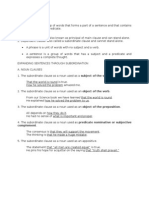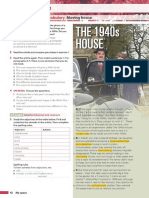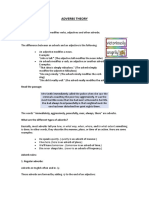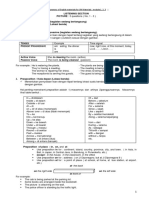Adverbs
Adverbs
Uploaded by
The Name is AMITOriginal Description:
Original Title
Copyright
Available Formats
Share this document
Did you find this document useful?
Is this content inappropriate?
Report this DocumentCopyright:
Available Formats
Adverbs
Adverbs
Uploaded by
The Name is AMITCopyright:
Available Formats
Adverb
The words that describe or add something to the meaning of a verb are called Adjectives of a verb or Adverbs.
ADjective of a VERB = ADVERB
Black horse is running slowly.
I went to movie yesterday.
The rain falls everywhere.
In these sentences, the words written in bold tell us something about the how, when or where the action is happening. These
are called Adverbs.
Types of Adverb
There are 6 types of Adverbs:
1. Adverbs of Manner
2. Adverbs of Place
3. Adverbs of Time
4. Adverbs of Number
5. Adverbs of Degree
6. Interrogative Adverbs
Types of Adverbs
1. Adverbs of Manner: The words that describe how or in what manner an action is done are called Adverbs of Manner.
For example: fast, carefully, politely, bravely etc.
Harish is running fast.
My father drives carefully.
You should talk politely.
Shivaji fought bravely against Akbar.
2. Adverbs of Place: The words that describe where the action is done are called Adverbs of Place. For example: inside,
outside, here, there, everywhere, anywhere etc.
Hari is playing outside.
My friend lives here.
The police searched for the thief everywhere.
You can paint anywhere.
3. Adverbs of Time: The words that describe when an action is done are called Adverbs of Time. For example: today,
tomorrow, yesterday, daily, early, immediately etc.
Mayur will go to Mumbai today.
I go to temple daily.
The students came to school early.
The doctor left immediately.
4. Adverbs of Number: The words that describe how often an action is done are called Adverbs of Number. For example:
twice, often, seldom, always etc.
I have seen Bahubali twice.
He often goes to orphanage.
Barking dogs seldom bite.
You always come home late.
5. Adverbs of Degree: The words which describe how much or to what extent the action is done are called Adverbs of
Degree. For example: very, partly, completely, quite, entirely, fully etc.
I am very interested in this project.
The tree is partly covering the road.
I have completely understood your problem.
He is quite disturbed.
6. Interrogative Adverbs: The adverbs, which are used for asking questions are called Interrogative Adverbs. For
example: when, where, how, why etc.
When are you going to Singapore?
Where have you kept the bag?
How will you solve this case?
Why are you late?
You might also like
- ADVERBDocument7 pagesADVERBYancie SiabocNo ratings yet
- Parts of Speech PDF BookDocument77 pagesParts of Speech PDF BookAmna ShoukatNo ratings yet
- BUS 101 - Business FundamentalsDocument4 pagesBUS 101 - Business FundamentalsJRod100% (1)
- A Sentence-Composing Approach-Instructor Manual PDFDocument85 pagesA Sentence-Composing Approach-Instructor Manual PDFjoeherazo4544100% (3)
- Tugas Artikel AdverbsDocument11 pagesTugas Artikel AdverbsZul ZulpikalNo ratings yet
- AdverbDocument3 pagesAdverbAnuradha MukherjeeNo ratings yet
- Learning Target: A. Use Adverbs (Adverbs of Manner, Place and Time) in SentencesDocument44 pagesLearning Target: A. Use Adverbs (Adverbs of Manner, Place and Time) in Sentencesdaisy bolasocNo ratings yet
- Parts of Speech BDocument7 pagesParts of Speech BCh Bilal AslamNo ratings yet
- Adverbs For Class 6Document3 pagesAdverbs For Class 6melody TrinidadNo ratings yet
- Foundation English PDF 3&4 Unit (Topics)Document56 pagesFoundation English PDF 3&4 Unit (Topics)Meer Bilal AliNo ratings yet
- Edited - MODULE 4-ADVERB - DEDILDocument11 pagesEdited - MODULE 4-ADVERB - DEDILGlaiza MapusaoNo ratings yet
- Tugas Bahasa InggrisDocument26 pagesTugas Bahasa InggrisMelly ShahabNo ratings yet
- Parts of SpeechDocument5 pagesParts of Speechsabiii writesNo ratings yet
- Adverb: Rules of Using AdverbsDocument3 pagesAdverb: Rules of Using AdverbsArsalan QureshiNo ratings yet
- English Adverb NotesDocument6 pagesEnglish Adverb NotesTanmoyNo ratings yet
- Notes For Assignments Sem 2Document28 pagesNotes For Assignments Sem 2soufwa18No ratings yet
- Meeting 1 - Part of SpeechDocument21 pagesMeeting 1 - Part of SpeechYuni YunikaNo ratings yet
- Orongan, Niña Michaela A. (English. Portfolio)Document4 pagesOrongan, Niña Michaela A. (English. Portfolio)ninya oronganNo ratings yet
- Annisa Alhamarini A1B021047 1B ING AdverbsDocument8 pagesAnnisa Alhamarini A1B021047 1B ING AdverbsAnnisa AlhamariniNo ratings yet
- G5 (English) KurmanjDocument23 pagesG5 (English) Kurmanjhajanisidad1No ratings yet
- Parts of SpeechDocument31 pagesParts of SpeechArtanti RifdahNo ratings yet
- Week 2 - Part of Speech (Noun, Pronoun, Verb, Adjective)Document39 pagesWeek 2 - Part of Speech (Noun, Pronoun, Verb, Adjective)Anisa LarasNo ratings yet
- What Is A Part of SpeechDocument10 pagesWhat Is A Part of Speechsneha walivadekarNo ratings yet
- AdverbsDocument17 pagesAdverbschyantalcbNo ratings yet
- G6 English Grade NotesDocument13 pagesG6 English Grade Notesjamesfortune438No ratings yet
- Kinds of AdverbsDocument23 pagesKinds of AdverbsMyla Angelica AndresNo ratings yet
- ADVERBDocument7 pagesADVERBABREHAMNo ratings yet
- B. Inggris Tentang AdverbDocument14 pagesB. Inggris Tentang AdverbM JodinNo ratings yet
- AdverbsDocument30 pagesAdverbsVane SolisNo ratings yet
- B InggrisDocument9 pagesB Inggrisgrafada29No ratings yet
- FRC Class 4 GrammarDocument78 pagesFRC Class 4 Grammararunima kumarNo ratings yet
- Parts of Speech - RevisedDocument35 pagesParts of Speech - Revisednoreenasyikin100% (1)
- q2 Mod 3-4 What Is An AdverbDocument50 pagesq2 Mod 3-4 What Is An AdverbJeneros PartosNo ratings yet
- AdverbDocument17 pagesAdverbMae CabanasNo ratings yet
- 4 - Adverbs, Prepositions, Conjunctions, InterjectionsDocument36 pages4 - Adverbs, Prepositions, Conjunctions, InterjectionsJose GremioNo ratings yet
- Lcture 4Document39 pagesLcture 4Mahmudul TahsinNo ratings yet
- Types and Position of AdverbsFinalDocument15 pagesTypes and Position of AdverbsFinalalzubair alojaliNo ratings yet
- Gramar 1Document4 pagesGramar 1psomeswari4No ratings yet
- Module MakingDocument7 pagesModule MakingJovelsshe CabualNo ratings yet
- PARTS OF SPEECH - MergedDocument67 pagesPARTS OF SPEECH - Mergedkiran krishnaNo ratings yet
- Adverbs Year 6Document9 pagesAdverbs Year 6Hayfa EshalNo ratings yet
- ClausesDocument54 pagesClausesjeremiah ocheaNo ratings yet
- Parts of Speech For AllDocument43 pagesParts of Speech For AllMuhammad TariqNo ratings yet
- Expanding SentencesDocument4 pagesExpanding Sentencesabigailalviz67% (3)
- AdverbsDocument2 pagesAdverbsChinonso KingsleyNo ratings yet
- Parts of SpeechDocument12 pagesParts of SpeechAngel Sheen Caing BentulanNo ratings yet
- AdverbsDocument6 pagesAdverbsAmna KhaliqNo ratings yet
- Group 2 DiscussionDocument8 pagesGroup 2 DiscussionRaphael AzariaNo ratings yet
- Parts of SpeechDocument39 pagesParts of SpeechRida AkramNo ratings yet
- Pass The BallDocument23 pagesPass The BallAnnalyn DizonNo ratings yet
- Adverb ClausesDocument29 pagesAdverb ClausesMingyee MingyeeNo ratings yet
- Blue Doodle Project Presentation 20240219 133719 0000Document17 pagesBlue Doodle Project Presentation 20240219 133719 0000alanNo ratings yet
- Adverbs Notes + WorksheetDocument4 pagesAdverbs Notes + WorksheetAryan PurwarNo ratings yet
- Adverb and Its TypeDocument5 pagesAdverb and Its TypeFarooq HaiderNo ratings yet
- Adverbs Final PPT 2Document19 pagesAdverbs Final PPT 2Jareeyy ferrNo ratings yet
- Grammar Cheat Sheet To Use With BellworkDocument8 pagesGrammar Cheat Sheet To Use With Bellworksaed ahmad100% (1)
- Week 2 Verb, Adverb, Preposition, Conjunction, Interjection & ArticleDocument65 pagesWeek 2 Verb, Adverb, Preposition, Conjunction, Interjection & ArticlerabeequreshiNo ratings yet
- 20 Parts of SpeechDocument12 pages20 Parts of SpeechRamuguha100% (1)
- Parts of SpeechDocument16 pagesParts of SpeechCarmen SanchezNo ratings yet
- Parts of SpeechDocument4 pagesParts of Speechhod auNo ratings yet
- Group 4 Chapter 4 AdverbDocument54 pagesGroup 4 Chapter 4 AdverbMenard NavaNo ratings yet
- 7 Days to Grammar Excellence: How to Master English from Beginner to AdvancedFrom Everand7 Days to Grammar Excellence: How to Master English from Beginner to AdvancedNo ratings yet
- Direct and Indirect SpeechDocument5 pagesDirect and Indirect SpeechThe Name is AMITNo ratings yet
- Direct and Indirect Speech - EditDocument4 pagesDirect and Indirect Speech - EditThe Name is AMITNo ratings yet
- Active and Passive: Rules For Changing The VoiceDocument2 pagesActive and Passive: Rules For Changing The VoiceThe Name is AMITNo ratings yet
- Coordinating ConjunctionsDocument3 pagesCoordinating ConjunctionsThe Name is AMITNo ratings yet
- Bài tập tuần 5: Phrase, Clause, SentenceDocument2 pagesBài tập tuần 5: Phrase, Clause, SentenceIvy PhạmNo ratings yet
- Resumen Giulio MongelliDocument4 pagesResumen Giulio MongelligiulioNo ratings yet
- Semantic Features: The Assassin Killed YukizayamaDocument10 pagesSemantic Features: The Assassin Killed YukizayamaCIX C9No ratings yet
- Top 100 English Communication Skills MCQs With Answers PDFDocument12 pagesTop 100 English Communication Skills MCQs With Answers PDFakshatguptaec20.rvitmNo ratings yet
- IELTS Academic Writing Task 1 - Vocabulary For Line GraphsDocument6 pagesIELTS Academic Writing Task 1 - Vocabulary For Line GraphsbetterIELTS91% (35)
- Adverbs of Manner ExercisesDocument4 pagesAdverbs of Manner ExercisesCristian RodriguezNo ratings yet
- Use of Lesson 5: Answer Key (Part 2) : All The Contents in Are Protected Under ADocument33 pagesUse of Lesson 5: Answer Key (Part 2) : All The Contents in Are Protected Under AsmhilezNo ratings yet
- Presentation of Parts of SpeechDocument23 pagesPresentation of Parts of SpeechTowsif MahdiNo ratings yet
- Jaylou M. Taborite Crim0 Section-ADocument7 pagesJaylou M. Taborite Crim0 Section-AJaylou M. TaboriteNo ratings yet
- Development of Modern EnglishDocument23 pagesDevelopment of Modern EnglishDebaleena DuttaNo ratings yet
- Linking Words II PDFDocument35 pagesLinking Words II PDFUmut AlıntaşNo ratings yet
- The Comparative Form of Adjectives and AdverbsDocument1 pageThe Comparative Form of Adjectives and AdverbsNgan Thanh VuNo ratings yet
- Mad Lib Lesson PlanDocument2 pagesMad Lib Lesson Planapi-298314457No ratings yet
- Insight - Pre Intermediate - ST - S BookDocument82 pagesInsight - Pre Intermediate - ST - S BookMaria DuarteNo ratings yet
- Adverbs TheoryDocument4 pagesAdverbs TheoryAnastasia García100% (1)
- A. Recitation of Kalimab. Recitation of HadithDocument18 pagesA. Recitation of Kalimab. Recitation of HadithRameez AbbasiNo ratings yet
- Adverbial ClausesDocument1 pageAdverbial ClausesCitra Arba Rojuna100% (1)
- AQA GCSE Chinese Textbook Unit 3Document47 pagesAQA GCSE Chinese Textbook Unit 3Susan SharkeyNo ratings yet
- Actividades Corregidas Ingles PDFDocument41 pagesActividades Corregidas Ingles PDFNayibisEstherCastroMayaNo ratings yet
- Academic StyleDocument8 pagesAcademic StylegerdaNo ratings yet
- 2020 Standard HSC Course BookletDocument40 pages2020 Standard HSC Course BookletFaith100% (1)
- Teacher: José Espejo. Student Name: Eslaisa Almánzar.: Grammar Plus Unit 8 1-Relatives Clauses of TimeDocument3 pagesTeacher: José Espejo. Student Name: Eslaisa Almánzar.: Grammar Plus Unit 8 1-Relatives Clauses of TimeEslaisa AlmánzarNo ratings yet
- Academic LanguageDocument37 pagesAcademic LanguageMarjun MejiaNo ratings yet
- SW7 - Themes9 - 10-Further PracticeDocument6 pagesSW7 - Themes9 - 10-Further PracticePhuongNo ratings yet
- Empower B1+grammar Unidades 6-10Document85 pagesEmpower B1+grammar Unidades 6-10Belenzhitap Reascos50% (2)
- 12th English Public Exam Official Model Question Paper 2018 2019 DownloadDocument22 pages12th English Public Exam Official Model Question Paper 2018 2019 DownloadMohammed SulaimonNo ratings yet
- Enses Resent Rogressive:::: Summery of English Materials For UN Materials: Module 1, 2, 3Document25 pagesEnses Resent Rogressive:::: Summery of English Materials For UN Materials: Module 1, 2, 3Salma FitriaNo ratings yet





























































































